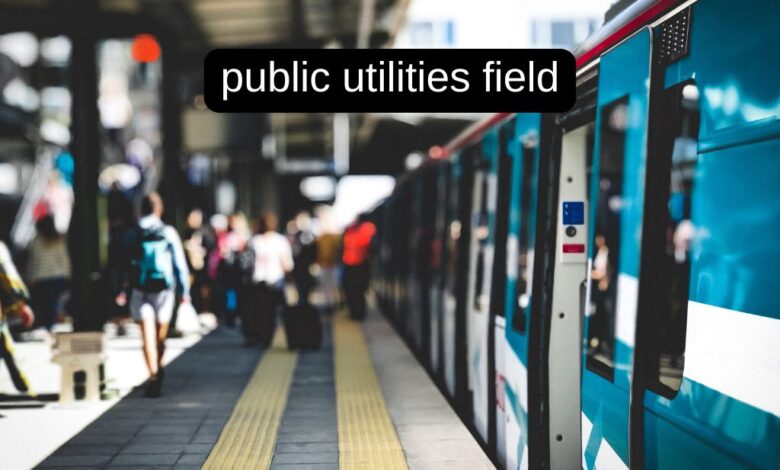Public Utilities Field: Everything You Need to Know for 2024

The public utilities field plays a crucial role in modern society, providing essential services such as water, electricity, natural gas, and waste management. These services are critical for the smooth operation of households, businesses, and entire communities. In this article, we will explore what the public utilities field entails, the various services it offers, career opportunities, and its future prospects. Additionally, we’ll address common FAQs and provide helpful tables to clarify key points.
What is the Public Utilities Field?
Public utilities Field refer to organizations, often regulated by the government, that provide essential services like electricity, water, gas, sewage treatment, and telecommunications to the public. Since these services are necessary for everyday life and economic stability, their availability must be reliable and affordable.
In many cases, public utilities are owned by private companies, government entities, or a combination of both. Because these services are vital, they are typically subject to strict regulations to ensure fair pricing, consistent supply, and equal access for everyone. Click Here
Types of Public Utilities
Let’s take a closer look at the main types of public utilities:
| Type of Utility | Description |
|---|---|
| Electricity | Provides power for homes, businesses, and industries. |
| Water | Supplies clean drinking water and manages water treatment. |
| Natural Gas | Delivers fuel used for heating, cooking, and generating electricity. |
| Waste Management | Includes garbage collection, recycling, and sewage treatment. |
| Telecommunications | Provides phone, internet, and cable services to homes and businesses. |
The Role of Public Utilities in Society
Public utilities support both economic growth and public health. They also help protect the environment. Let’s discuss these roles in more detail:
- Supporting Economic Growth: Businesses and industries depend on reliable utility services to operate efficiently. For instance, factories need electricity to power machines, offices require the internet for communication, and homes rely on water and electricity for daily activities.
- Protecting Public Health: Clean water, effective waste management, and safe sewage treatment prevent the spread of diseases. These services are essential to keeping communities healthy and safe from environmental hazards.
- Preserving the Environment: Many utility companies are moving toward more sustainable practices. For example, some focus on renewable energy sources like wind and solar power, while others improve recycling and waste management systems. By doing this, public utilities help reduce environmental damage.
How Public Utilities Work
Now, let’s dive into how public utilities function. These companies combine infrastructure, technology, and expertise to deliver essential services to customers efficiently. Here’s an overview of how the major utilities work:
Electricity
First, power plants produce electricity using sources like coal, natural gas, nuclear power, or renewable energy such as solar and wind. Then, the electricity travels through a network of power lines, eventually reaching homes and businesses. Utility companies manage the distribution of electricity to ensure it’s always available at a fair price.
Water
Water utilities extract water from natural sources like rivers, lakes, and underground reservoirs. Once the water is collected, they treat it to make sure it’s safe for drinking and other uses. After that, the treated water is distributed through a network of pipes to homes and businesses. Utility companies also collect and treat wastewater to safely return it to the environment.
Natural Gas
Natural gas is extracted from the earth, processed, and delivered through pipelines to homes and businesses. It’s primarily used for heating and cooking, making it an important energy source. Public utilities ensure the safe delivery of gas while keeping it affordable for consumers.
Telecommunications
Telecommunications utilities offer phone, internet, and cable services. These services are essential for communication, business operations, and entertainment. Therefore, utility companies work hard to provide reliable, high-speed connections to meet the needs of modern life.
Career Opportunities in the Public Utilities Field
The public utilities field offers a wide range of career opportunities for people with diverse skills and qualifications. As a result, many people are drawn to this industry for its job stability and competitive pay. Below are some common roles within the field: Read More
| Job Title | Description |
|---|---|
| Electrical Engineer | Designs and maintains electrical systems and grids. |
| Water Treatment Specialist | Ensures the water supply is clean and safe for public use. |
| Lineworker | Installs and repairs power lines to ensure electricity distribution. |
| Environmental Engineer | Works on projects that reduce the environmental impact of utility services. |
| Customer Service Representative | Assists customers with utility services, billing, and inquiries. |
| Waste Management Specialist | Oversees garbage collection, recycling programs, and waste treatment. |
Due to the industry’s focus on environmental sustainability, many utilities are now investing in “green” jobs. These roles involve working on renewable energy projects and developing environmentally friendly solutions to waste management.
Challenges Facing the Public Utilities Field
Despite its importance, the public utilities field faces several challenges. By understanding these challenges, utility companies can continue to provide reliable services while addressing future needs.
- Aging Infrastructure: Much of the infrastructure used to deliver utilities, such as water pipes and electrical grids, is old. Consequently, many utility companies are now working to upgrade their systems to prevent service disruptions.
- Environmental Concerns: With the growing urgency of climate change, there is increased pressure on utility companies to reduce their environmental impact. For instance, this may include investing in renewable energy or improving waste management practices.
- Cybersecurity Threats: As more utilities move online, they face the risk of cyberattacks. Utility companies need to protect their systems from hackers who could potentially disrupt services.
- Regulation and Pricing: Public utilities are heavily regulated to ensure fair pricing and reliability. However, striking a balance between regulation and profitability is a constant challenge for companies in this field.
The Future of the Public Utilities Field
Looking ahead, the public utilities field will continue to evolve as technology advances and the demand for sustainability grows. Here are some trends that will likely shape the future of this industry:
1. Smart Grids
Smart grids use advanced digital technology to improve the reliability of electricity distribution. By detecting and reacting to changes in electricity demand, smart grids make the system more efficient. As a result, they can automatically reroute power in the event of an outage, reducing downtime for customers.
2. Renewable Energy
With governments pushing to reduce carbon emissions, renewable energy sources like wind and solar power are rapidly growing. Utility companies are investing heavily in these technologies, making them a significant part of the future of energy production.
3. Water Conservation
Water shortages are becoming more common in certain areas, leading water utilities to focus on conservation. Thus, these companies are enhancing recycling programs and encouraging customers to reduce water waste.
4. Waste Management Innovations
Innovations such as waste-to-energy plants are gaining popularity in the waste management sector. These plants convert garbage into energy, helping reduce landfill waste while providing a renewable power source.
5. Electric Vehicles (EVs)
As electric vehicles become more widespread, the demand for electricity will increase. Utility companies are preparing for this shift by expanding EV charging infrastructure and improving their grids to handle the extra load.
FAQs
1. What is the purpose of public utilities?
Public utilities provide essential services like electricity, water, and waste management that allow homes and businesses to function. Without these services, daily life and economic activities would be difficult.
2. How are public utilities regulated?
Government agencies regulate public utilities to ensure that services are reliable and fairly priced. Regulations also aim to prevent monopolies and ensure that everyone has access to these vital services.
3. What are the major types of public utilities?
The major types of public utilities include electricity, water, natural gas, waste management, and telecommunications.
4. What is a smart grid?
A smart grid is an advanced electricity network that uses digital technology to improve the efficiency and reliability of electricity distribution.
5. How do public utilities impact the environment?
Public utilities, especially those in the energy and waste sectors, can have a significant environmental impact. However, many companies are now shifting to more sustainable practices, such as using renewable energy and enhancing waste recycling.
Conclusion
In conclusion, the public utilities field provides essential services that keep modern society running smoothly. From powering homes to delivering clean water, public utilities are integral to our daily lives. Moreover, the field is evolving with advances in technology and a growing emphasis on sustainability. As a result, it offers diverse career opportunities and promises an exciting future, especially in areas like renewable energy and waste management.

